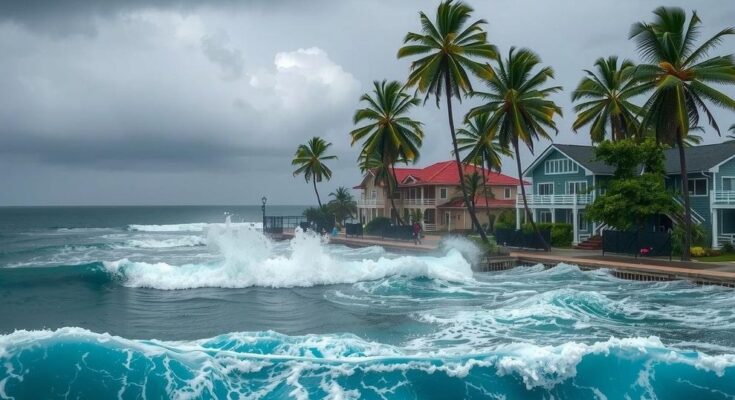Cyclone Chido has devastated Mayotte, leading to fears of thousands dead and significant destruction of infrastructure. Rescue operations are hindered by damage to the territory’s airport and widespread outages. Experts link the cyclone’s intensity to climate change, raising concerns over future humanitarian challenges in vulnerable regions.
On Monday, rescue efforts were underway to reach the French overseas territory of Mayotte in the Indian Ocean, which has suffered catastrophic damage from Cyclone Chido, the most severe storm to strike the region in nearly a century. Authorities report that while the confirmed death toll is currently at 14, there are concerns that casualties may reach hundreds or even thousands due to the densely populated nature of the territory, which houses approximately 300,000 residents. The unprecedented storm has devastated entire neighborhoods, especially in slum areas where buildings were poorly constructed.
Officials from France have emphasized the depth of the destruction, reporting extensive damage to public infrastructure, including airports and hospitals. The damage to the airport control tower limits the landing capabilities to military aircraft only, further complicating rescue operations. Additionally, electricity outages have affected the entire archipelago, hindering relief efforts. Emergency personnel and medical support, along with supplies, have been dispatched from mainland France and the nearby territory of Reunion to assist in the crisis.
Mayotte is the poorest region under European Union sovereignty, and despite its economic struggles, it attracts migrants from surrounding poorer nations due to the welfare benefits provided by the French state. The French Red Cross has reportedly indicated that as many as 100,000 citizens live in makeshift slum housing, much of which has been entirely destroyed following the cyclone’s passage. Cyclone season had just commenced in the southwestern Indian Ocean when Chido struck Mayotte, having made landfall on Madagascar shortly thereafter.
Experts attribute the increased intensity of Cyclone Chido to climate change, noting that while the total number of annual cyclones has not displayed a significant increase, the instances of more powerful storms have risen, a trend likely fueled by warmer air and sea temperatures. Such developments highlight the urgent need for comprehensive disaster preparedness and climate adaptation strategies, particularly in vulnerable regions.
Cyclone Chido impacted Mayotte on December 23, 2023, unleashing devastating winds and rainfall on the territory. Mayotte is characterized by its unique socio-economic challenges, being the poorest territory under European Union jurisdiction and home to a significant number of inhabitants living in slum conditions. The cyclone’s severity underscores the growing risks posed by climate change, which has been linked to the increased intensity of weather events, including tropical cyclones in the Indian Ocean region. Addressing these vulnerabilities is essential for safeguarding populations in such environmentally precarious regions.
In conclusion, Cyclone Chido has inflicted catastrophic consequences on Mayotte, with fears of a considerable death toll and extensive damage to infrastructure and homes within vulnerable communities. The response efforts are complicated by the destruction of vital services, necessitating urgent aid from French authorities. The incident serves as a stark reminder of the escalating impacts of climate change, particularly regarding severe weather patterns affecting economically disadvantaged areas.
Original Source: www.cbsnews.com




